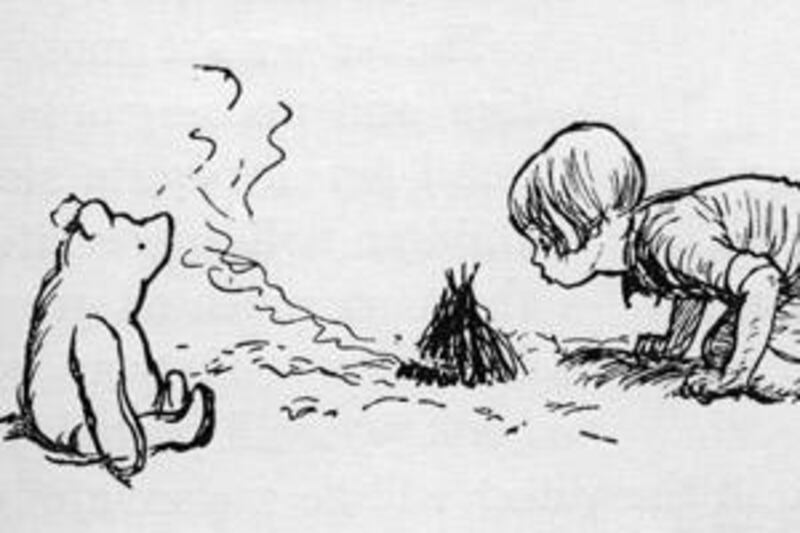"Pooh and Piglet, Christopher Robin and Eeyore were last seen in the Forest - oh, can it really be 80 years ago?" So asks the prologue to Return to the Hundred Acre Wood, the first authorised sequel to AA Milne's classic tale of that "bear of Very Little Brain", Winnie-the-Pooh. It is indeed hard to believe that eight decades have passed since the last adventure of Pooh and his forest friends. We are told that the portly bear "may have put on a few ounces in 80 years" and that Christopher Robin is now a slightly older schoolboy with a brand new bright blue bicycle. But just two pages in, as an anxious Pooh grapples with counting his honey pots, it is as if he and his chums have never been away.
As comebacks go, it is up there with a new James Bond story, but the fanfare has so far been Piglet-small. Despite racking up column inches in newspapers across the world, Pooh's long-awaited new adventures were not unveiled with a glitzy press launch, with all the subtlety of a bouncing Tigger. However, of this one can easily imagine that the original author would have approved. Approval was absolutely key, too. Milne's successor, David Benedictus, has been nibbling away at the Milne estate for the chance to write a new story for more than a decade: he had such fun recording audio books with the likes of Dame Judi Dench (Kanga) and Stephen Fry (Pooh) that he thought it a huge shame there were not more stories to tell. So he wrote two chapters - and hit a big brick wall called Disney, which owned all the rights to the characters. But when those rights reverted back to the trustees, they tracked down Benedictus, told him that they liked the idea but weren't so keen on Rabbit becoming a hallucinatory bipolar pirate digging for treasure (seriously). That agreed, the fun began.
Benedictus has had a lot of people to please - not least Pooh's many fans. The original books are children's classics, for the simple reason that AA Milne didn't write them to sell millions of copies (although of course they have). Instead, the first instalment started out as a 1925 bedtime story for his son, Christopher, owner of the titular teddy bear, and bore all the natural, good-humoured hallmarks of the very best night-time tales.
EH Shephard's illustrations became immortal too - everyone can picture the floppy-eared Eeyore and a custard-coloured bear with one paw in a honey pot. Sensibly, Benedictus hasn't sought to change much and, as the book points out, even Mark Burgess's drawings are "in the style of the original EH Shephard illustrations". The delightful first chapter also follows some of the Milne rules. It has the trademark subtitle, in this case "in which Christopher Robin returns" and "hums" Pooh's poems.
Reading Return to the Hundred Acre Wood is truly lovely, like revisiting one's own childhood. Benedictus has the rhythms of Milne's sentences just right, and it is difficult to do anything but smile when the famously poor speller Owl proudly explains the invitations to Christopher's party: "It says Welcum three times, because that's how pleased we are to see him back." Naturally, not everyone has "Welcumed" the update - and Benedictus has been taken aback by the amount of what he calls "Pooh-people" accusing him of heresy. Much of this is down to the new character, Lottie the Otter. She wears a pearl necklace, has a penchant for sardines in olive oil and plays a pretty mean tune on the mouth organ. A new invention she may be, but she is also great fun and fits right into the Hundred Acre Wood, so it seems rather odd that she has come in for criticism. It is not as if she crawls out of the river with an iPhone in a Louis Vuitton handbag.
For those who aren't yet convinced, Benedictus has a chance to win them over this weekend when he reads from the new book at a special event in the village of Hartfield in Sussex, where AA Milne wrote his stories. He is unlikely to find a difficult audience. The criticism has thus far come from cynical sorts who haven't read the book yet and fear a money-spinning cash-in, rather than the labour of love it so clearly is. To date, the reviews from those who have actually spent an hour or so with Pooh and friends have been overwhelmingly positive, the only criticism seeming to be that Benedictus's poetry is not quite as good as Milne's.
That, though, is to be expected. And when Christopher Robin asks, "But are you really going to write us new adventures? Because we rather liked the old ones", you sense that Benedictus really understands the responsibility, and the enormity, of what he has undertaken.






